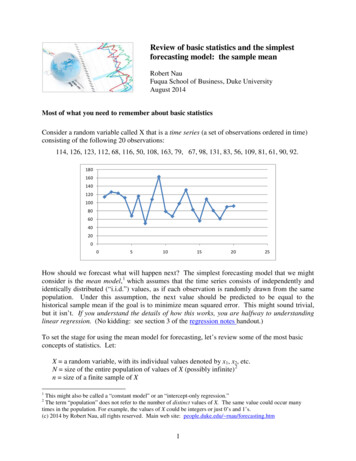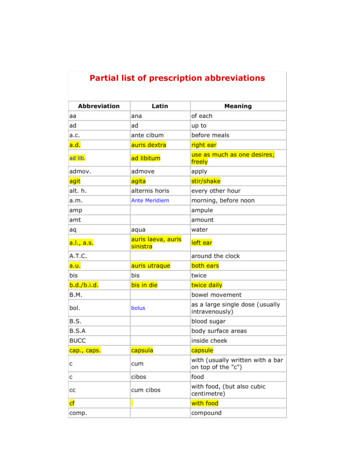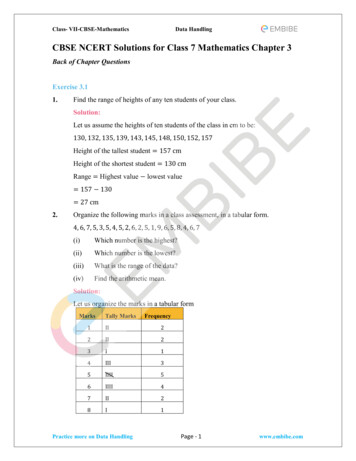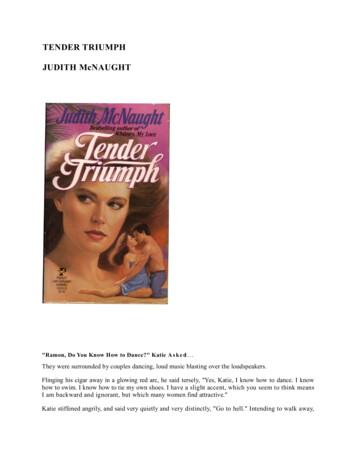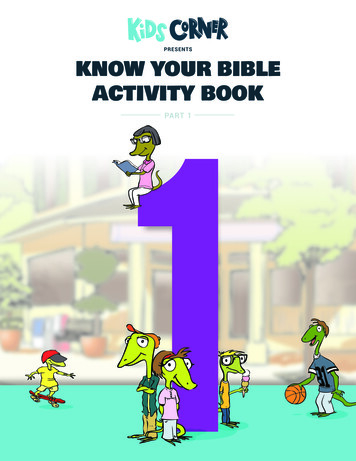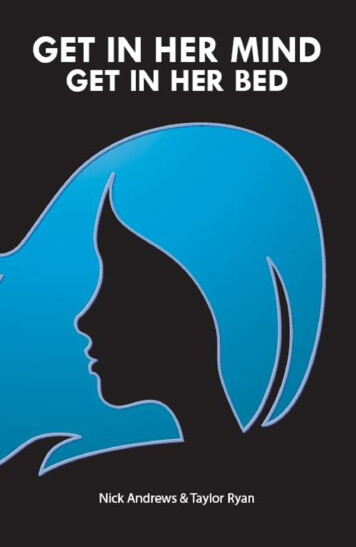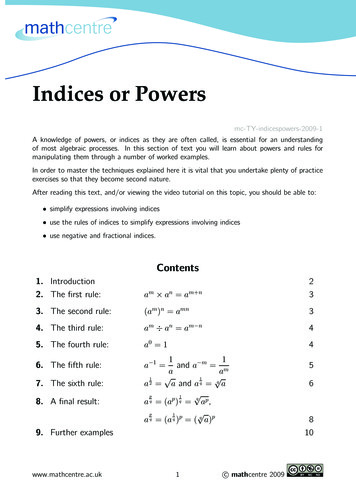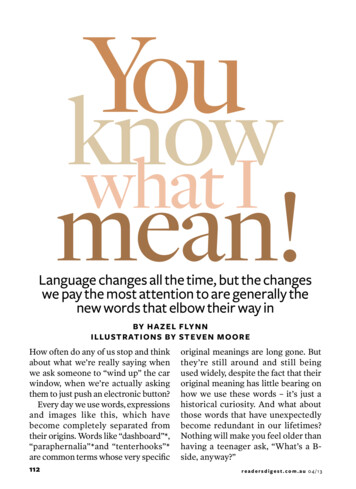
Transcription
Youknowwhat Imean!Language changes all the time, but the changeswe pay the most attention to are generally thenew words that elbow their way inby H a z e l F ly n nI l lu st rat i o n s by st e v e n m o o reHow often do any of us stop and thinkabout what we’re really saying whenwe ask someone to “wind up” the carwindow, when we’re actually askingthem to just push an electronic button?Every day we use words, expressionsand images like this, which havebecome completely separated fromtheir origins. Words like “dashboard”*,“paraphernalia”*and “tenterhooks”*are common terms whose very specific112original meanings are long gone. Butthey’re still around and still beingused widely, despite the fact that theiroriginal meaning has little bearing onhow we use these words – it’s just ahistorical curiosity. And what aboutthose words that have unexpectedlybecome redundant in our lifetimes?Nothing will make you feel older thanhaving a teenager ask, “What’s a B side, anyway?”readersdigest.com.au 04 /13
DJs, GROOVES ANDOTHER RELICSIf you’re of an age to remember theBeatles when they were in their prime– or even Wings, come to that – you’repart of the generation that could neverhave guessed LP records would turnout not to be a new cultural medium,like TV, but something that rose andfell within a lifetime. Those big blackvinyl discs took off in the 1950s, weremust-haves in the ’60s and ’70s andwere dying out by the mid-’80s, thanksto the invention of the CD. (New vinylis being released, but only forcashed-up collectors or lo-fi musicnerds). Yet we still describe a nagas “sounding like a broken record”and say someone in a rut is “stuck ina groove”.The concept of the single managedto hang on until CDs were, themselves,largely made history by digitaldownloads. But a CD single lackedsomething even the humblest vinylsingle had: a B-side or flipside. Musiccompanies, artists and producers114i ssued singles with a track they felt hadhit potential on the A-side. But thepeople running radio shows had theirown ideas. Some of the biggest hits,including The Righteous Brothers’“Unchained Melody”, only reached thecharts because DJs flipped the recordover and decided they’d rather play theB-side. Flipsides are history, but theterm lives on, as does DJ, itself ananachronism – today’s radio hostsprogramme digital tracks rather thanjockeying discs.The change from physical records todigital files has also drained the literalmeaning from a powerful imagefeatured in break-up songs for morethan 40 years. It’s one we could allrelate to: after the split, all the sharedworldly goods go back to their originalowner. For broken-hearts still in theirteens or 20s, the most precious of thosepossessions was likely to be recordedmusic. In the 1978 single “Can’t StandLosing You” by The Police, Sting sangplaintively, “I see you’ve sent my lettersback/And my LP records and they’reall scratched”. In his huge 2011 hit“Somebody That I Used to Know” themusician known as Gotye sang, “No* Dashboard was a wooden or leatherprotective shield at the front of asleigh or carriage to block the mudbeing “dashed” up by horses’ hooves;Paraphernalia was a legal termfor a bride’s personal possessions(as opposed to dowry);Tenterhooks were metal hooksused to stretch wet fabric acrosswooden frames.readersdigest.com.au 04 /13
you didn’t have to stoop so low/Haveyour friends collect your records andthen change your number”.We know what Gotye meant, eventhough for anyone born after 1985 theconcept of packing up records of anykind is impossibly quaint. While itmight now be more literally true, “Youdidn’t have to deny me access to theCloud account where all your musicdownloads are stored” just doesn’thave the same ring.THAT’SENTERTAINMENT,OLD-SCHOOLEver warned your kids about getting“square eyes” from watching too muchTV, even though all TV sets now areframed as rectangles? You’re not alonein using outmoded terms. Theentertainment bible Variety still refersto “the silver screen” even though thelenticular screens embedded with realsilver that were used in the very earlydays of cinema are all but forgotten.Home screen technology has movedon, too, but our language hasn’t. Westill say we’ve “taped” a show to watchlater, more than a decade after DVRsreplaced VCRs. And now that we haveentire (pay-TV) channels devoted to“films” – yet another term that has hungon despite its increasing irrelevance tothe medium – the “midday movie” and“movie of the week” are long gone. Theinternet and social media have alsokilled off the idea of an “armchair”critic: when anyone with smartphonecan post reviews of everything theyconsume, be it music, magazines orfood, any time they like, we’re all critics– and we’ve well and truly left thearmchair behind.HANG-UPS ANDFLOPPIESIf you’re old enough, the infuriatingsound of someone “slamming thephone down” or “hanging up right inmy ear” has almost acquired a nostalgicglow. Like “hanging up”, “dialling a115
Words you thoughtyou knew Bellwether: now it means somethingindicative of a trend, eg, a bellwetherelectoral seat. In medieval times itreferred to the castrated ram followed bya shepherd’s flock, identified by the bellaround its neck.Capitulate: do it these days and yousurrender, but it started out meaning to listunder headings, and then came to meandrawing up agreements or negotiate.Crimping: squeezing something intosmall folds, as with a pie’s pastry lid, is along way from the original meaning offorcing someone into military or marineservice.Chortle: one of many words and phrasesmade up by Alice in Wonderland authorLewis Carroll, this description of laughterblends “chuckle” and “snort”.Elf: forget the ethereal Lord of the Ringsbeauty of Liv Tyler – elves were originallydangerous, malign creatures whose namecomes from an old German word fornightmare.Haggard: if you look haggard you appearworn out and unwell, but its originalmeaning was an adult hawk that had beencaptured in order to be trained.Maverick: derived from the 19th centuryTexan rancher Samuel Maverick, who didnot brand his cattle; it originally referredto unbranded cattle before coming tomean someone who stands apart from thepack.Sarcophagus: while you might think ofthose stone coffins helping to preservebodies, the literal meaning from the Greekis flesh-eating stone.116number” dates back to rotary phones,complete with fingerholes in round dials that made a satisfying whirr asthey turned.The ubiquity of mobile phonesmeans that while today’s teenagersstill suffer plenty of angst aboutwhether their current crush will call,they do it in different ways. No more“waiting by the phone” – occasionallygiving in to the urge to pick up thehandset to check it really wasconnected, remember? No more callsthat “ring out” unanswered. No moretelephone booths for Superman tochange in, either.Changes in computer technologyalso mean that the once-instantlyrecognisable sound of a dial-upmodem is largely extinct, giving riseto scores of web pages, where you cango to revisit recordings of it.But computers also immortalisedead technology: look at the icon nextto “Save” on your computer’s wordprocessor. It’s a picture of a 3.5" floppydisk. Why? Because it started that way,back in the days when floppy disks, ordiskettes, were cutting edge, and hasnever changed. Send an email andyou’ll see fields marked “cc” and“bcc”: carbon copy and blind carboncopy; jargon from the typewriters thatcomputers themselves replaced. Weaccept these things unthinkingly, justas we accept the hourglass symbolmeaning “wait”, despite the absenceof hourglasses in modern life.Similarly, when you look for themicrophone jack on your computer,you’ll find an old-style microphone –readersdigest.com.au 04 /13
the kind that Johnny Carson used onThe Tonight Show in the ‘50s.IT’S NOT ALL BADThere are some obsolete terms that,like cigarette lighters in cars, we’requite happy to see the back of. “Onefor the road” comes to mind. So does“Sunday best”, a phrase that carrieswith it itchy discomfort. We don’t misspaying exorbitant charges for overseascalls, thanks to pre-paid phone cardsand Skype. “Encyclopedia salesmen”and “typists” exist now only in oldmovies, where signs promising“Express 60-minute photos” must readlike an undelivered joke to the cameraphone generation.For good or ill, the world moves on.Sometimes language goes with it andsometimes fossils are left behind – it’ssomething to think about next timeyou open the glove compartment. n
114 readersdigest.com.au 04/13. you didn’t have to stoop so low/Have your friends collect your records and then change your number”. We know what Gotye meant, even though for anyone born after 1985 the concept of pack
